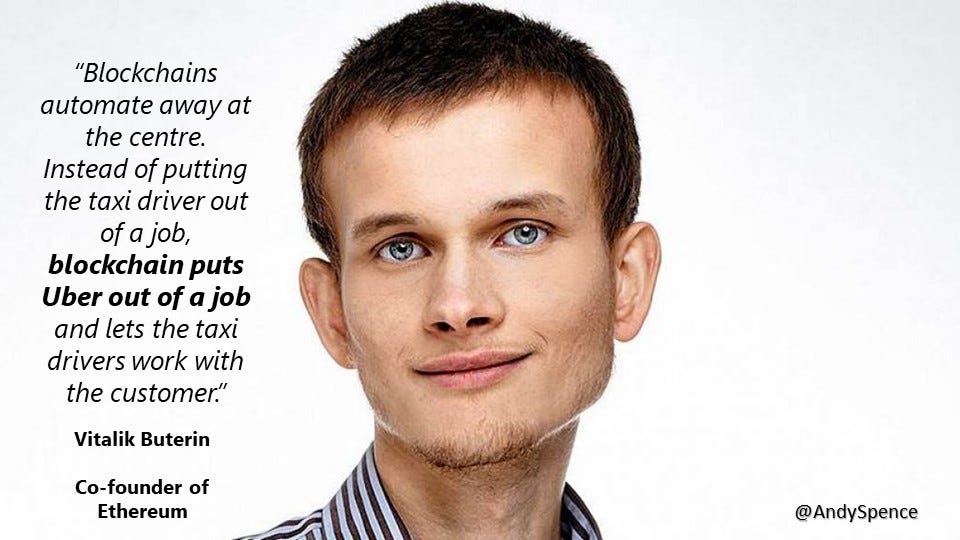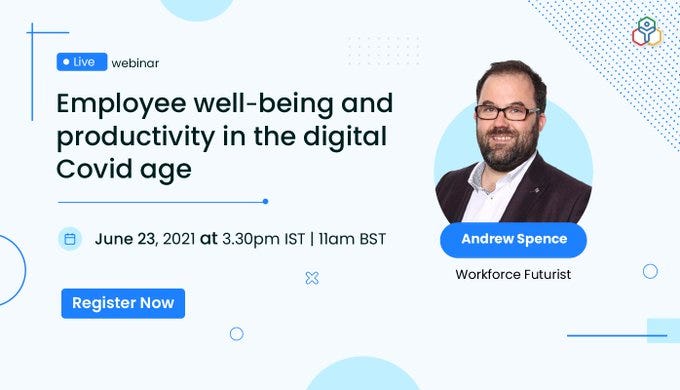Hi, I’m Andy Spence and this is the Workforce Futurist Newsletter about the rapidly changing world of work.
This is the 12th regular article delivered to your inbox every other week. Thanks to all those who have shared these articles. If you enjoy the content, please ❤️ above, share with friends, and consider subscribing if you haven’t already 👇
In this edition, I ask how do we gain trust in new online ventures, and highlight the potentially scary overlap between wellbeing and workforce technology.
Digital Organisations and Trust
Decentralised autonomous organisations, or DAOs, have been a powerful idea in the blockchain universe for many years.
In my article Blockchain and the Decentralised Workforce I describe how Decentraland, a multi-player virtual world, use DAOs to run their organisation.
DAOs originate from the Ethereum school of Vitalik Buterin.
Definitions of DAOs aren’t going to help, so let’s break it down.
We understand Digital - yep, actually sick of the word.
We understand Organisation - been there and done that.
But Autonomous is more problematic.
Definition of Autonomous - (of a machine, device, etc.) able to operate with little or no human control or intervention.
David Hoffman from Bankless has cunningly dropped the ‘autonomous’ word, to bring us to Digital Organisations.
Digital Organizations are compositions of humans without geographic constraints.
This is apt for the Digital-Covid Age when most of our knowledge workers are distributed geographically and most are wearing their pyjamas.
In 2014, Buterin provided an incomplete terminology guide to DAOs, DAs and DOs possibly influenced by this terrible song by The Police.
The premise with DAOs is that we can build decentralised organisations using digital smart contracts and tokens, all encrypted and avoiding centralised servers.
The smart contracts allow processes, rewards, and rules to function via source code.
In my paper on Blockchain and Work, from 2018, I highlighted a quote from Joseph Lubin (another Co-Founder of Ethereum)
Massive intelligence on a decentralized global computational substrate, an underlying layer, should change the architecture of the firm from a large collection of specialized departments run by humans, to software agents that can cooperate for longer periods of time to serve ongoing customer needs such as utility and maintenance. Others will swarm round a short-term problem solve it, dissolve just as quickly, having served their purpose.
DAOs like this are best viewed in the context of the ongoing march of automation, rather than blockchain development per se.
Amazon are known for their ability to harness data and technology and deliver about 400 million packages per month. Their platform is very efficient, however, they also have 1,300,000 employees who work there too.
I have highlighted some recent developments with DAOs on Workforce Futurist, for example with the publishing platform, Mirror. $Write tokens are used to share equity in its publication with the writers. It’s been carefully designed by smart humans like Patrick Rivera and colleagues. The publication has a clear purpose, and contributing writers have trust that any equity will be paid out fairly in the future because they trust the team at Mirror.
Mirror uses technology to achieve its goals, as Amazon does.
Many successful teams in business in the past have been organised using a simple Excel spreadsheet, email, a common goal, and a dose of trust.
Trust is the very human attribute that doesn’t melt away with blockchain-enabled tools, but these tools can help.
The context for digital organisations isn’t slow database technology, but rather social psychology and organisation design.
DAOs include some of the tools and processes needed for certain types of organisations to function. Questions for entrepreneurs using DAOs might include:
what features of DAOs (for example Colony or Aragon) make it beneficial to achieve their goals?
what kind of business models will develop?
will the network effect be different with DAOs to existing models?
I could draw a Venn diagram showing organisations (with people), DOs, and DAOs but the British Summer is far too short as it is…
For some more context, my recent 30 min talk on Blockchain and the Decentralised Workforce is available here, and builds on my research paper to extrapolate how work might change over the next decade or two.
If you know anyone in your network who might enjoy this article then please share👇
Doctor Microsoft Will See You Now 👩⚕️
From trust in the DAO, to trust at work.
Workforce Tech is hot at the moment with Monday IPO last week ($7.6B valuation) and Eightfold’s recent fund raising valuing it at over $2B.
There’s money to be made in our data.
I have previously highlighted how Microsoft is becoming increasingly dominant in Workforce Technology with Viva, Teams, LinkedIn, GitHub, Glint.
Microsoft has filed a patent to give wellness recommendations based on a user’s personal data.
From an intimate understanding of our work behaviour, it seems that Microsoft now has plans for understanding our health too.
With user’s permission, Microsoft would be able to use
Biometric data such as heart rate, blood pressure
Work event data – writing/reading emails, attending meetings, corrections made when writing an email, audio data from meetings, tone of language in email, how hard you press the keyboard.
By cross-checking work and biometric data (from a secondary device like a Fitbit), Microsoft could begin to understand what work events are triggering anxiety.
Dear Andy – every time you have a meeting with Cara – we notice you feel more anxious
One of the challenges in People Analytics is the ‘So What Question’.
What do we do with this finding? I can’t stop meeting my boss!
One principle for work designers, using workforce technology is :
Empower Workers, Don’t Spy on them 🙈
In an era of Digital Taylorism, for every company that will roll out technology to empower workers, there will be another that does not.
There is a danger is that this technology in the wrong hands might be used as a pernicious worker surveillance tool.
As I mentioned in my article from a few years ago, The Quantified Workplace: Technology vs Trust? we can introduce new workforce technology but only at the speed of employee trust.
On this topic, I will be presenting a webinar on employee wellbeing and productivity on June 23rd with Zoho, which you are invited to attend.
World Exclusive from Enrique from Hacking HR
It’s always a pleasure to speak with Enrique Rubio, from Hacking HR.
In our 15 minute conversation, we covered:
🔷 the role of HR in the #FutureOfWork
🔷 A WORLD EXCLUSIVE - how Enrique got sacked!
🔷 and the decentralised workforce
In Real Life
And for those of you who are lucky enough to meet your colleagues in real life…

Do share with me your comments, experiences and insights - just reply to this email, or connect on Twitter or LinkedIn.










